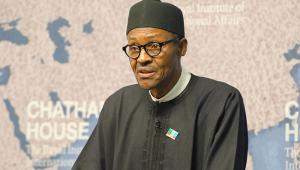Speaking at a conference hosted by Adam Smith International in London today, Babatunde Fashola said 63.17bn naira ($200m) had been paid out since the government’s record public spending plans were passed at the start of May.
Following a delay in signing the 2016 budget, which tripled capital expenditure on last year, the government has also been criticised for its sluggish implementation of the budget.
In June, Eze Onyekpere, a lawyer working for Nigeria’s Centre for Social Justice, complained to PFI that it was unclear whether implementation had even started. “We cannot see a single contract mobilising,” he said. Delays meant work on road, power and other programmes stalled or came to a halt altogether.
However, Fashola said today that the billions of naira paid out since June had got contractors back to work.
“As some credibility has come back into government, some contracts have gone on to finish, and on the basis of some payments contractors are back to site, so things haven’t been idle,” he told reporters, following a speech and panel discussion on infrastructure at the event.
The fact that funds are finally starting to flow will come as a relief to contractors and ease some concerns about the viability of the government's ambitious infrastructure programme. Around 30% of the $30bn budget was dedicated to capital expenditure in a bid to revive the country's ailing economy, which is at risk of entering recession after a contraction in the first quarter of 2016.
Despite the government operating at 55% of expected revenues, Fashola is confident it will have the ability to finance the planned stream of infrastructure projects.
He pointed out that oil prices and production are on the up, with the latter now reaching 1.9 million barrels per day. At the same time, he said the government is set to start drawing on substantial uncollected tax revenues as tax administration starts to improve, while a number of initiatives are in place to reduce operational costs. Across his portfolios, these include boosting training in-house staff, including structural and civil engineers, project managers and planners in order to save cash on external consultants.
He described the vandalisation of gas pipelines by militants in the Niger Delta as a “temporary setback” for the country’s gas production, but also an “opportunity” to look at other sources of power and diversify the energy mix.
Combined with ageing and inefficient infrastructure, vandalism of gas pipelines has put Nigeria’s power generation capacity at an all time low.
As a result of the instability, the government has been forced to focus on a more diverse energy mix. This meant ministers were in a better position to identify which areas have the best capacity for which source of power, Fashola said. There was a “clearer-eyed view” of where to put and deploy transmission capacity, and efficiency and energy costs are better imbedded into project planning from inception.
A target to generate 20,000MW of power by 2020 is “aspirational”, he said, but obstacles to reaching it are “manmade”, and can be fixed.
Fashola said the country’s energy choices will be defined by “immediate necessities” and while renewable sources will be a big part of the mix, it intends to “optimise” as many different kinds of energy as possible.
“We are going to do a lot more gas and a lot more coal, because really there is no coal in our mix, whereas in South Africa or the US there is 30% coal. I don’t see us going that far but we have to optimise everything we have,” he said.
He stressed that renewable energy will play a role, especially in light of commitments Nigeria made, along with most other countries in the world, to limit global temperatures to below 2°C at the historic climate conference in Paris last year.
Transmission programmes and projects which have already been awarded funding will take priority, as will be the case with road works.
A major challenge in all infrastructure projects, he continued, is how to connect them to people at “street level” and realise the benefits for their users, as well as help them to recognise their significance.
For example, Fashola said “cultural differences” had not been properly taken into account in previous housing initiatives, meaning homes often aren’t a good fit for their occupants. The ministry will work to fix that.
Although he would not comment on Nigerian minister of budget and national planning, Udoma Udoma’s, commitment to aim to implement 100% of the budget in 2016, Fashola said there is a “much more dedicated and committed process of implementation” in terms of both spend and capacity.












